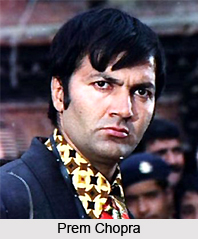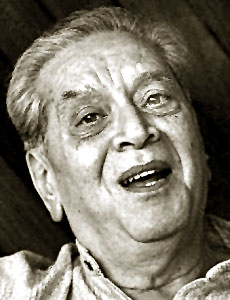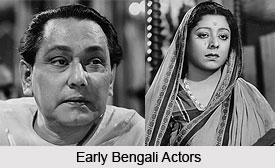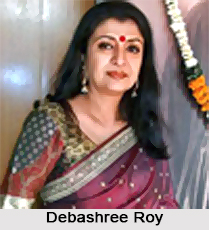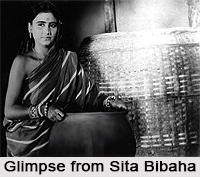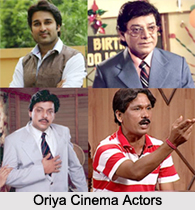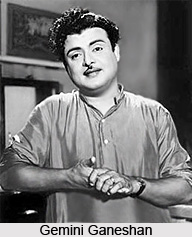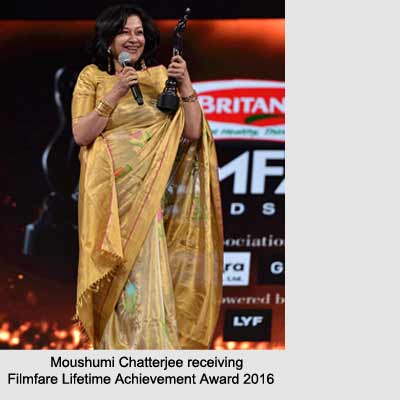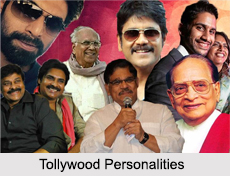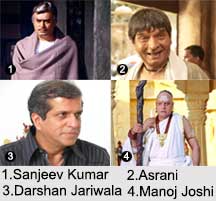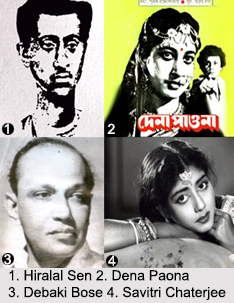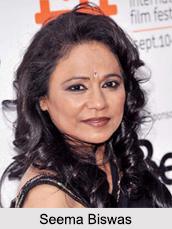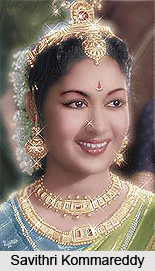Introduction
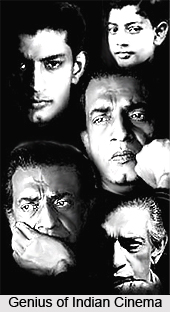 Satyajit Ray, son of Sukumar Ray, was a one man army who changed the very way in which people looked at Indian cinema. Satyajit Ray and genius are two sides of the same coin. There were several international films that had widely influenced Satyajit Ray. His self proclamations establish that he was greatly affected by the Bicycle Thief, which actually inspired him to make films. And closer home it was Rabindranath Tagore.
Satyajit Ray, son of Sukumar Ray, was a one man army who changed the very way in which people looked at Indian cinema. Satyajit Ray and genius are two sides of the same coin. There were several international films that had widely influenced Satyajit Ray. His self proclamations establish that he was greatly affected by the Bicycle Thief, which actually inspired him to make films. And closer home it was Rabindranath Tagore.
It is near impossible to sum up the achievements of Satyajit Ray. He had made with such conviction that the audience will be compelled to believe in his beliefs. The issues that he raises in his films will oblige a person to think about it. That is the excellence of Satyajit Ray! The subtle nuances in his films are impossible to miss.
Satyajit Ray died of illness in 23rd April, 1992. The death of Satyajit Ray left a void in the Indian filmdom that was never to be filled.
Childhood of Satyajit Ray
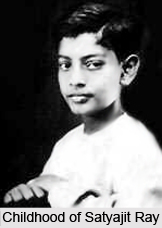 Satyajit Ray was born on 2nd May 1921, the year his father Sukumar Ray fell seriously ill. He belongs to an affluent family in Kolkata and is the grandson of Upendrakishore Ray Chaudhuri, was a distinguished writer, painter, a violin player and a composer. Upendrakishore, pioneer in half-tone block making and founded one of the finest presses in the country - U. Ray & Sons, died six years prior to the birth of Satyajit Ray.
Satyajit Ray was born on 2nd May 1921, the year his father Sukumar Ray fell seriously ill. He belongs to an affluent family in Kolkata and is the grandson of Upendrakishore Ray Chaudhuri, was a distinguished writer, painter, a violin player and a composer. Upendrakishore, pioneer in half-tone block making and founded one of the finest presses in the country - U. Ray & Sons, died six years prior to the birth of Satyajit Ray.
In the 1880`s `Brahmo Samaj` was embraced by the family of Satyajit Ray. As a reaction to Christianity, `Brahmo Samaj was set up, to take care of the western literature and abolish traditional Hindu practices like `Sati`. With a logical and progressive outlook of Brahmo Samaj, Satyajit Ray`s work was greatly influenced by the same. Later on the movement of Brahmo Samaj was led by Devendranath Tagore. Many of Satyajit Ray`s films like; Devi, Charulata, Teen Kanya, Sadgati, Ghare Baire and Ganashatru have been influenced by the philosophy of Brahmo Samaj.
Early Childhood of Satyajit Ray, 1926
After Sukumar Ray`s death the printing house shifted hands, as a result Satyajit along with his mother had to leave their spacious house, and move to maternal uncle`s house. Those were tough days and his mother taught needlework to supplement the household income. It was here that he met cousin Bijoya, his future wife, for the first time. From a very young age he had been taught by his mother, but when he was eight years old, Satyajit joined Ballygunj Government School.
The love for films developed while he was at school, where he regularly read Hollywood trivia in magazines like Photoplay and Picturegoer. He also had keen interest in western classical music too. He would often pick-up gramophone records at flea markets.
College Life of Satyajit Ray, 1936
Satyajit Ray was not very keen on studies and on his mother`s insistence he enrolled at Presidency College, where, for the first two years he read science, and for the third year, he took economics. (An uncle had assured him a job if he graduated in economics). Satyajit started to spend more and more time watching films and listening to western classical music on his gramophone, all these at the expense of academics.
Once he started watching various types of films his interest had shifted from stars to the filmmaker, highly appreciating the works of John Ford, Frank Capra, Ernst Lubitsch and William Wyler. He became a regular member of Sight & Sound.
In the year 1939, he graduated from Presidency College, and decided to discontinue with studies. In spite of having no formal training he decided to pursue his career as a professional artist. But his mother was against him taking up a job at such a young age and she felt he should join as a student of painting at Shantiniketan.
Discovery of Oriental Art by Satyajit Ray, 1940-41
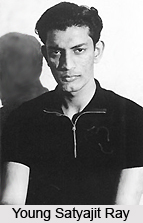 After initial reluctance Satyajit Ray decided to enrol as a student of art at Vishva-Bharati University in Shantiniketan. The desire to be successful in the field of painting and lure of Rabindranath Tagore were too strong to let go. During his stint as a student of art he realized certain concepts for the first time. It was here that he encountered Indian villages for the first time. He also discovered the essence of oriental art- Indian sculpture and miniature painting, Japanese woodcuts and Chinese landscapes. Till then, his knowledge was limited to only westernized art forms. His love and affection for Indian grew during this time and also realized the use of minute details in Indian art to imply a bigger meaning. This is an idea which has been used by him many times in his films. His art teacher at Shantiniketan was Binode Behari Mukherjee, who had a profound mark of him. Satyajit made a documentary on Binode Behari Mukherjee - The Inner Eye, 1972, as a tribute to his mentor.
After initial reluctance Satyajit Ray decided to enrol as a student of art at Vishva-Bharati University in Shantiniketan. The desire to be successful in the field of painting and lure of Rabindranath Tagore were too strong to let go. During his stint as a student of art he realized certain concepts for the first time. It was here that he encountered Indian villages for the first time. He also discovered the essence of oriental art- Indian sculpture and miniature painting, Japanese woodcuts and Chinese landscapes. Till then, his knowledge was limited to only westernized art forms. His love and affection for Indian grew during this time and also realized the use of minute details in Indian art to imply a bigger meaning. This is an idea which has been used by him many times in his films. His art teacher at Shantiniketan was Binode Behari Mukherjee, who had a profound mark of him. Satyajit made a documentary on Binode Behari Mukherjee - The Inner Eye, 1972, as a tribute to his mentor.
Even when he was at Shantiniketan he listened to variety of western music and watched world cinema. He would borrow books from university library and read books on cinema like Paul Rotha`s `Film Till Now` and Raymond Spotiswoode`s `Grammar of the Film. Though his love for films was very much there, but that he would become professional filmmakers had not crossed his mind till then.
Ray Returns to Kolkata after Tagore`s Death, 1942
Tagore died in the year 1941 and it was a personal loss for Ray. In the later half of 1942, Satyajit started to miss the city life of Kolkata as a result made frequent trips to the city during weekends, visiting his mother and cousin Bijoya.
While at Shantiniketan he missed the entire happenings of the country and in December 1942, Satyajit left Shantiniketan for his home in Kolkata.
Early Career of Satyajit Ray
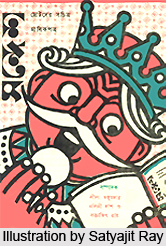 Early career of Satyajit Ray has been that of creativity. He had been associated with an ad agency named D.J. Keymer as a graphic designer. He worked there for thirteen years and then made his move to films. His visit to the West in the year 1950 had a lasting impression on him, where he watched many international movies and helped him decide to make the final plunge.
Early career of Satyajit Ray has been that of creativity. He had been associated with an ad agency named D.J. Keymer as a graphic designer. He worked there for thirteen years and then made his move to films. His visit to the West in the year 1950 had a lasting impression on him, where he watched many international movies and helped him decide to make the final plunge.
Job as a Graphic Designer, 1943
Early career of Satyajit Ray includes life in typography and graphic designing. Long before he plunged into full fledged filmmaking he spent 13 years in D.J. Keymer - a British-run advertising agency, as a junior graphic designer. After the success of Pather Pachali he shifted to full fledged filmmaking.
Satyajit was absolutely thrilled by English and Bengali typography and produced many innovative and interesting advertising campaigns. Two of his designs of typefaces "Ray Bizarre" and "Ray Roman" won him international acclaim in the year 1971. He brought in Indian calligraphic and motifs to advertising. Later one sees that his love for illustration and typography has been found in opening credits and publicity posters of all his films. Ray`s senior colleague at D.J. Keymer, D.K. Gupta started a publishing house `Signet Press` and Satyajit was roped in to do the design of cover jackets. Satyajit Ray, by his own admission, was unfamiliar with Bengali Literature and was also alien to bulk of Rabindranath Tagore`s work. It was in 1944, when D. K. Gupta thought of publishing an abridged version of Bibhutibhushan Bandyopadhyay`s Pather Panchali, Ray was asked to do the illustrations. The book had a lasting impression on him and sowed the seed of starting a film on this project. The Signet Press also reprinted Sukumar Ray`s Abol-Tabol (Hocus-Pocus) and Ha-ja-ba-ra-la (Higgledy Pigleddy) where Satyajit did the illustrations.
It was during his association with the Signet Press that he came across some of the best composition of Bengali Literature and he indulged in extensive reading. He designed the jackets for these books. He also adapted these stories for his later films as well.
Ray as a Film Critic, 1947
After the World War II there was a huge market for American Films in Kolkata, and this provided the opportunity for Satyajit and his friends to feast on these films. Ray, along with his friend Bansi Chandra Gupta, co-founded Film Society, which was first in Kolkata. The first film that they screened was "Battleship Potemkin".
Satyajit Ray soon started writing variety of articles on cinema. These articles got published in many magazines and newspapers, in both Bengali and English. A collection of these articles, written between 1948 and 1971, were later published as a book `Our Films, Their Films`.
Meanwhile during this period, Ray had also developed a keen interest in writing screenplays. He did it out of pleasure and he would take novels and stories of a yet-to-release film wrote screenplays for the same. Then he would compare the screenplay with the finished film. In some cases he would even write a second version of the screenplay.
Ray`s Encounter with Jean Renoir, 1949
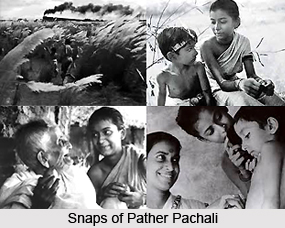 Jean Renoir had visited Kolkata in 1949 in search for location of his film "The River". Ray fixed an appointment with Renoir and sought a meeting. Soon Satyajit accompanied Renoir on his trip, during weekends, to search for film locations to outskirts of the city, Kolkata.
Jean Renoir had visited Kolkata in 1949 in search for location of his film "The River". Ray fixed an appointment with Renoir and sought a meeting. Soon Satyajit accompanied Renoir on his trip, during weekends, to search for film locations to outskirts of the city, Kolkata.
This was the beginning of his journey in films. His meeting with Renoir inspired him to plunge into films.
Effect of `Bicycle Thieves` on Ray, 1950
Ray went to London in 1950 for a business trip which ultimately resulted in an important turn in his career. In his 16 day journey to London he sketched a rough screenplay of Pather Pachali. And he wanted to shoot the film in real locations.
During his six month stay aboard, he saw many types of films, each having unique and typical significance. But the film which made a serious impact on him was Vittorio De Sica`s Bicycle Thieves. Later in the introductory part of his book `Our Films, Their Films`, he wrote- "All through my stay in London, the lessons of Bicycle Thieves and neo-realist cinema stayed with me".
This film actually inspired him to make a feature film himself and also reaffirmed his belief that it was possible to shoot realistic cinema with an entirely amateur cast and shooting at real venues.
On his return journey to India he had completed the final draft of the screenplay for Pather Pachali.
Satyajit Ray as Filmmaker
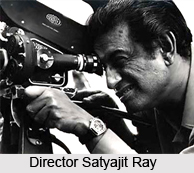 Satyajit Ray as filmmaker has made Indians proud. His films have toured several festivals and won numerous awards. His films reflect the social standing of West Bengal during those times, and some of them had satirical overtones. After his trip to London he was encouraged to become a professional filmmaker. The Vittorio De Sica`s film The Bicycle Thief (1948) had a profound impact on Ray and he decided to film Pather Panchali.
Satyajit Ray as filmmaker has made Indians proud. His films have toured several festivals and won numerous awards. His films reflect the social standing of West Bengal during those times, and some of them had satirical overtones. After his trip to London he was encouraged to become a professional filmmaker. The Vittorio De Sica`s film The Bicycle Thief (1948) had a profound impact on Ray and he decided to film Pather Panchali.
In the initial years however, the Pather Pachali had many problems during the making period. The then Bengali producers were sceptical about the film, as they completely distrusted a first time filmmaker. Pather Pachali took two and a half years to get made, with entirely new faces, which lacked the experience of feature films. In the year 1955 Pather Pachali was completed and turned out to be huge success commercially and received critical acclaim. The film won many awards in 1956 Cannes International Film Festival. This film by Ray assured him the financial backing it needed and helped him to complete the Apu Trilogy: Aparajito (1956; The Unvanquished) and Apur Sansar (1959; The World of Apu).
The Trilogy of Apu tells the tale of a poor son of a Brahmin priest, and his journey in life- his growth from childhood to manhood, which moves from a tiny village to Kolkata. The main theme that reflects in the film is that of modernity and tradition. In his later films he never returned to his concept again, his subsequent films became more and more contemporary and emphasised more on psychology rather than traditional narrative. He consciously avoided repeating himself, and as a result his films were successful in capturing the wide spectrum of mood, period, milieu and genre, with comedies, tragedies, romances, musicals, and detective stories treating all ranks of Bengali society from the mid-19th to the late 20th century.
Most of the characters of Satyajit Ray film possess average talent and ability, unlike the topic of his documentary films that include Rabindranath Tagore (1961) and The Inner Eye (1972). The concept that fascinated Ray most was the inner conflict of a person. Most of his films contain feelings and thoughts, rather than plot and action.
The best films of Ray were based on stories and novels by Tagore, who had a profound influence on the director. The film Charulata (1964; The Lonely Wife) is among such works, where a tragic love story set within a rich Bengali family which had a western influence, is perhaps Ray`s most accomplished film. The film Teen Kanya (1961; "Three Daughters," English-language title Two Daughters), based on short stories of Tagore, is a diverse Trilogy about women, while Ghare Baire (1984; The Home and the World) is a solemn take of Bengal`s first revolutionary movement, set during the period 1907-08 of British rule.
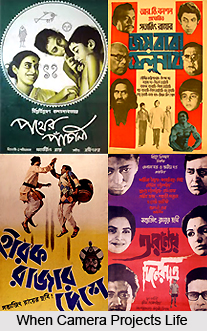 Major part of Ray`s films is based on Hindu feudal vales and traditionalist mindset, and their possible clash with the contemporary westernised reformist ideas. The film Jalsaghar (1958; The Music Room) is an unusual take about a man who is compassionate and obsessed about music. Then Devi (1960; The Goddess), a film which portrays the obsession with a girl`s divine incarnation; and Kanchenjungha (1962), Ray`s first innovative screenplay and first film in colours, a delicate study of the concept of arranged marriage among rich and westernized Bengali society. Ray`s first film in Hindi Language were Shatranj ke Khilari (1977; The Chess Players), with comparatively big budget. This films probes deep into the delicate concept of western influence in India.
Major part of Ray`s films is based on Hindu feudal vales and traditionalist mindset, and their possible clash with the contemporary westernised reformist ideas. The film Jalsaghar (1958; The Music Room) is an unusual take about a man who is compassionate and obsessed about music. Then Devi (1960; The Goddess), a film which portrays the obsession with a girl`s divine incarnation; and Kanchenjungha (1962), Ray`s first innovative screenplay and first film in colours, a delicate study of the concept of arranged marriage among rich and westernized Bengali society. Ray`s first film in Hindi Language were Shatranj ke Khilari (1977; The Chess Players), with comparatively big budget. This films probes deep into the delicate concept of western influence in India.
Humour is an important aspect in Ray films. The films like Parash Pathar (1957; The Philosopher`s Stone) and in the musical satire Goopy Gyne Bagha Byne (1969; The Adventures of Goopy and Bagha) have had a lasting impact on the audience. The music for the latter film was composed by Ray himself, and is among his best-known contributions to Bengali culture.
Other works of Ray mainly concerns the city life of Kolkata, apart from Ahsani Sanket (1973; Distant Thunder) that deals with moving story of the Bengal Famine of 1943-44. Aranyer Din Ratri (1970; Days and Nights in the Forest) treats us with adventures of four young men in a rural forest region. Mahanagar (1963; The Big City) and a trilogy of films made in the 1970s-Pratidwandi (1970; The Adversary), Seemabaddha (1971; Company Limited), and Jana Aranya (1975; The Middleman)-inspect the fight for employment of the middle class against a backdrop (from 1970) of radical, Maoist-inspired aggression, government oppression, and sinister corruption.
After a break in where Ray made Pikoo (1980). He subsequently fell ill with heart disease. Later with Ganashatru (1989; An Enemy of the People), an Indianized version of Henrik Ibsen`s play, he returned to the subject of corruption in society. Shakha Prashakha (1990; Branches of the Tree), and the sublime Agantuk (1991; The Stranger), had tough male centric characters, defiantly objecting to the moral and intellectual rot of adored Bengal.
Satyajit Ray as a Music Composer
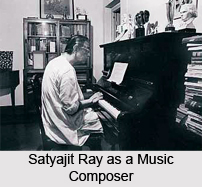 Satyajit Ray was a powerhouse of talent. No other film director, during his time, apart from Akira Kurosawa of course, has such a huge range of talent. Satyajit Ray delved deep into many territories from pure farce to high tragedy and from musical fantasies to detective stories. To describe a man of such stature is not an easy job at all. His greatness is not limited to the Apu Trilogy alone. Satyajit Ray as a writer has also won many hearts. The character of Feluda and Professor Shanku still remains a bright part of Bengali Literature. Andrew Robinson wrote about Ray, in a comparison with Kurasawa, in his book Satyajit Ray: The Inner Eye that "I fear his range may never be fully understood, given that his films describe Bengal, which (unlike Japan) is of little political, economic or cultural importance to the world - and in a language unknown even to most Indians.
Satyajit Ray was a powerhouse of talent. No other film director, during his time, apart from Akira Kurosawa of course, has such a huge range of talent. Satyajit Ray delved deep into many territories from pure farce to high tragedy and from musical fantasies to detective stories. To describe a man of such stature is not an easy job at all. His greatness is not limited to the Apu Trilogy alone. Satyajit Ray as a writer has also won many hearts. The character of Feluda and Professor Shanku still remains a bright part of Bengali Literature. Andrew Robinson wrote about Ray, in a comparison with Kurasawa, in his book Satyajit Ray: The Inner Eye that "I fear his range may never be fully understood, given that his films describe Bengal, which (unlike Japan) is of little political, economic or cultural importance to the world - and in a language unknown even to most Indians.
Apart from literary creations, Ray`s contribution to the world of music is also noteworthy. During his early days as a filmmaker, Ray worked with legends of Indian Classical Music looking to extract the best out of them, completely depending on their knowledge, proficiency, skill and understanding of the classical gharanas. He went ahead with Pt. Ravi Shankar for the Apu Trilogy (Pather Panchali, Aparajito & Apur Sansar) and Parash Pathar (The Philosopher`s Stone, 1958) Ustad Vilayat Khan for Jalsaghar (The Music Room, 1958) and Ustad Ali Akbar Khan for Devi (The Goddess, 1960).
During Ray`s association with these legendary musical figures it happened that Ray`s own understanding of music did not always meet, giving rise to an occasion for resentment. Ray`s over exuberant musical ideas, and professional musician`s offence in being guided too much, led him to compose music himself for all his films later on. So ever since Teen Kanya (Three Daughters, 1961), he himself took over the mantle of music direction.
Satyajit Ray always believed that music is an integral part of films, as it helps to uphold the sensibility, emotion and true pulse of the film. So it maintained that thorough work needs to done on the musical aspect right from the step of script writing. 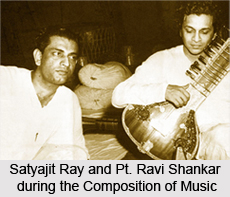 He took special care of the fact that the narrative of the film and the corresponding musical score evolved simultaneously. He would often keep regular notes of musical ideas and thoughts as a when they evolved, and meticulously jotting down music either in Indian or western notation, depending on the musicians he had on board. The composing of music would give him immense satisfaction as he once wrote in an article of his that "... The pleasure of finding out that the music sounds as you had imagined it would, more than compensates for the hard work that goes into it. The final pleasure, of course, is in finding out that it not only sounds right but is also right for the scene for which it was meant".
He took special care of the fact that the narrative of the film and the corresponding musical score evolved simultaneously. He would often keep regular notes of musical ideas and thoughts as a when they evolved, and meticulously jotting down music either in Indian or western notation, depending on the musicians he had on board. The composing of music would give him immense satisfaction as he once wrote in an article of his that "... The pleasure of finding out that the music sounds as you had imagined it would, more than compensates for the hard work that goes into it. The final pleasure, of course, is in finding out that it not only sounds right but is also right for the scene for which it was meant".
Satyajit Ray was of the option that musical notes often made a complex narrative simpler, thus helping the audience to understand better. Often an expression can be better expressed through musical notes than by human acting. He could himself play a number of musical instruments and had an enthusiastic and keen sense for tune and rhythm. Ray was an avid listener to western classical music. He was an ardent listener of Beethoven, Mozart and Bach, and even incorporated their compositions in his own creations. He composed particular theme music for feature films and usually used it as background score, and this did not necessarily fit into a given or established musical establishment and was often the culmination of different musical strains.
Apart from doing the musical composition for all his films post Devi, Satyajit Ray also scored the music for documentaries like Glimpses of West Bengal, Gangasagar Mela and Darjeeling: Himalayan Fantasy directed by Bansi Chandragupta, House that Never Dies by Tony Meyer, Max Mueller by John Thiele, and Quest of Health by Harisadhan Dasgupta.
Satyajit Ray scored music for feature films which were directed by others as well like Baksa Badal (Director: Nityananda Datta), Shakespeare Wallah (Director: James Ivory) and Fatikchand (Director: Sandip Ray) as also for Sandip`s TV serials like Satyajit Ray Presents (Part I and II).
Satyajit Ray as an Artist
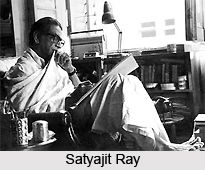 Satyajit Ray as an artist has created some of the best works that the world has ever seen. He was a multi dimensional personality who has revolutionized the Indian art from. During his art education in Viswa Bharati University founded by Rabindranath Tagore he was highly inspired by his masters Nandalal Bose and Benod Behari Mukherjee. These two stalwarts of Bengali art actually had a profound impact on young Ray. Later, during his initial career as a junior graphic designer, he would first envisage a thought and a picture, then go on to explore its deep meaning, and then give it a meaningful form and shape, finally corroborating it with the original image he had in mind, be it for a cover of a book or an illustration for a story or a poster of a film.
Satyajit Ray as an artist has created some of the best works that the world has ever seen. He was a multi dimensional personality who has revolutionized the Indian art from. During his art education in Viswa Bharati University founded by Rabindranath Tagore he was highly inspired by his masters Nandalal Bose and Benod Behari Mukherjee. These two stalwarts of Bengali art actually had a profound impact on young Ray. Later, during his initial career as a junior graphic designer, he would first envisage a thought and a picture, then go on to explore its deep meaning, and then give it a meaningful form and shape, finally corroborating it with the original image he had in mind, be it for a cover of a book or an illustration for a story or a poster of a film.
It is actually Satyajit Ray who was a pioneering force behind the new wave in Indian commercial art form. He added aesthetic touch and innovative thoughts to it. He revolutionized the art of typography and book jacket designs. His work experience as a graphic designer left him a more creative person.
Typography by Satyajit Ray
Interest for typography within Ray did not actually initiate with metallic letters used for printing but with calligraphy done with thick brush. The lavishness of Ray`s calligraphic typography attracted the attention of lot of people in 1943. That very year he started to work as a cover designer for books published by Signet Press. He designed advertisement logo for new publications and modern Bengali poems.
He also designed advertisements for new publications to fill the very small spaces he got in the yellowish pages of the well-liked periodicals printed in newsprint. No metallic types satisfied him, so he used his own skills and creativity to draw the cover to go with the mood of the poem. For the covers he found no metallic type suitable enough to go with the moods of the poems. Satyajit Ray created numerous new Bengali typefaces which have refreshingly original yet perfectly legible form.
The typefaces designed by Ray may be classified into two different streams: architectural (replicable) and calligraphic (non-replicable).
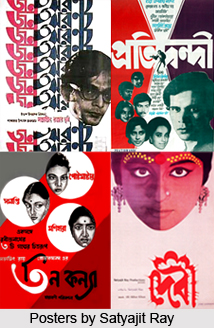 Satyajit Ray designed and created architectural typefaces for the logos and titles that would be repeated for a given period in all the issues of periodicals, including Sandesh, the children`s magazine that he edited. On the other hand, he very often designed calligraphic letterings for the frontispieces that would be printed only once.
Satyajit Ray designed and created architectural typefaces for the logos and titles that would be repeated for a given period in all the issues of periodicals, including Sandesh, the children`s magazine that he edited. On the other hand, he very often designed calligraphic letterings for the frontispieces that would be printed only once.
Ray created only four Roman fonts (Ray Bizarre, Ray Roman, Daphnis and Holiday Script), while he created many new fonts in Bengali.
Daphnis is actually partly architectural. The upper parts of the letters are architectural, while the lower parts are not. Ray Bizarre too is partly architectural for the same reason. Holiday Script looks like an accidental creation in a game played among friends during a picnic.
Ray is the first and possibly the only designer artist of typefaces in Bengal who inspired an entire community to love and appreciate the beauty of the letters and alphabets of their mother tongue. One of the reasons for the Bengali`s love of reading is their ability to appreciate the beauty the Ray typography
Illustrations by Satyajit Ray
Satyajit Ray worked as an illustrator and had his own style of designs which we have come to love and appreciate. He studied art for two years and five months at Viswa Bharati University in Shantiniketan. There he mastered the art of handling the painting brush with extreme dexterity. He learned the detailed use of a brush and also how to use brush strokes in varied thickness for one particular composition. There were times when his brushing became harsh and coarse, full of fidgety energetic straight lines, and sometimes the lines had a lyrical flow.
He illustrated his book covers, film posters, children`s books, billboards, publicity material and even the title cards
Book Jackets by Satyajit Ray
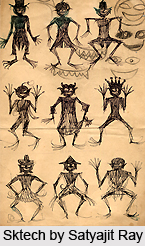 Satyajit Ray, abandoned the clean formal designing style, and transformed the idea of book cover designing in India. He was one of the first artists from India to experiment with the design and style of brushing that was purely Indian. His easy painting strokes, broad and pointed were the hallmark of his designs of book jackets during the early phase of his career. But his education in Shantiniketan and the inspiration he drew from Benode Behari Mukherjee and Nandalal Bose, his teachers, initiated him in a journey that found expression in numerous designs and styles. At every given stage he re-invented himself as an artist and designer and broke various boundaries and became a legend.
Satyajit Ray, abandoned the clean formal designing style, and transformed the idea of book cover designing in India. He was one of the first artists from India to experiment with the design and style of brushing that was purely Indian. His easy painting strokes, broad and pointed were the hallmark of his designs of book jackets during the early phase of his career. But his education in Shantiniketan and the inspiration he drew from Benode Behari Mukherjee and Nandalal Bose, his teachers, initiated him in a journey that found expression in numerous designs and styles. At every given stage he re-invented himself as an artist and designer and broke various boundaries and became a legend.
His typical style made it possible for him to create masterpiece for Signet Press (a publishing house that Ray designed the cover of the abridged Bibhuti Bhushan Bandopadhyay novel Pather Panchali, that went on to become the inspiration for his magnum opus).
Advertisements by Satyajit Ray
After finishing his art education in Shantiniketan for over two years he returned to Kolkata and joined an ad company named D.J. Keymer where he worked as a junior graphic designer. He worked there for 13 years before plunging into filmmaking.
Costumes by Satyajit Ray
Satyajit Ray always maintained a red cloth bound copy (Kheror Khata), where he sketched his editing, cinematography, art direction and designs. He designed posters, slides, titles, booklets, publicity materials and everything that post production required. His talent and ingenuity found expression in meticulously designed dresses and costumes for his characters. One of the most important costumes that he designed was for his film named Goopi Gyne Bagha Byne (The Adventures of Goopi and Bagha) and Hirak Rajar Deshe (The Kingdom of Diamonds).
In his Goopi Bagha series he designed the costumes in great details for the character of Goopiy, Bagha, King of Shundi, and the ministers of King of Diamonds, the Chief Minister, the magician, the guards and the sycophant. He also designed the magical slippers that Goopi and Bagha used in the film.
Satyajit Ray as a Graphic Designer
Before he decided to become a full time filmmaker, Ray was a graphic designer in an ad agency in Kolkata. Early career of Satyajit Ray was that of a graphic visualizer and he also made designs cover jackets for "Signet Press" and drew the illustrations for stories.
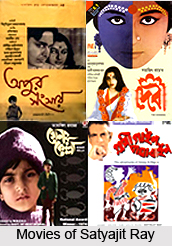
Although much had been written about Satyajit Ray remains essentially insurmountable to this day. Ray`s biographer, Andrew Robinson, mentioned in his book that there are two good reasons to learn Bengali. One is Rabindranath Tagore and the other is definitely Satyajit Ray.
Satyajit Ray as Writer
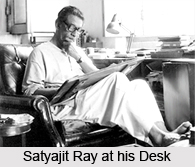 Satyajit Ray as a writer, has gifted the readers some of the best and immortal characters in Bengali Literature. He created popular characters for children in Bengali like Feluda and Professor Shonku- who still remains a bright part of Bengali Literature. The character of FeluDa is of a private detective and Professor Shanku is a scientist.
Satyajit Ray as a writer, has gifted the readers some of the best and immortal characters in Bengali Literature. He created popular characters for children in Bengali like Feluda and Professor Shonku- who still remains a bright part of Bengali Literature. The character of FeluDa is of a private detective and Professor Shanku is a scientist.
Ray was an imminent fiction writer. He created the character of Feluda in the year 1965 and the first story of Feluda was published in Sandesh. Feluda stories are actually narrated by his cousin Topshe, kind of Watson to Feluda`s Holmes. The science fiction of Shanku is available to the readers as a diary discovered after the scientist had mysteriously disappeared. Satyajit also wrote a collection of non-sense verse called "Today Bandha Ghorer Dim" which, among other thing, includes a translation piece of Lewis Carrol`s "Jabberwocky". He also wrote short humorous stories of Mullah Nasiruddin in Bengali.
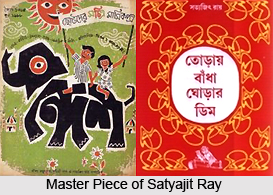 His collection of short stories for adults was published as a collection of 12 stories. He also wrote a story collection named "Golpo 101". Ray`s love and interest for puns and puzzle is reflected in these stories. These short stories give full bridle to his awareness in the macabre, in suspense and other aspects that he cleverly avoided in film, making for an interesting psychological read. Most of his literary piece have been translated into English, and are finding a new group of readers.
His collection of short stories for adults was published as a collection of 12 stories. He also wrote a story collection named "Golpo 101". Ray`s love and interest for puns and puzzle is reflected in these stories. These short stories give full bridle to his awareness in the macabre, in suspense and other aspects that he cleverly avoided in film, making for an interesting psychological read. Most of his literary piece have been translated into English, and are finding a new group of readers.
Major part of the screenplays of Ray`s films has been published in a literary journal named "Eksan". He also wrote an autobiography about his childhood days named "Jakhan Choto Chilam" (1982, when I was a Child). Ray also wrote essays on films which were published as "Our Films, Their Films" (1976), along with "Bishoy Chalachitra" (1976), "Ekei Bole Shooting" 1979.
In the mid 1990, the essay`s of Ray based on filmed were published in English in the Western countries. "Our Films, Their Films is an anthology of film criticism by Ray. This book contains articles, write ups and personal experiences. The book is presented to the readers in two parts. In the first part Ray discusses about Indian Films and its turning point and then in the second part he tells us about the kind of work in Hollywood, and discuses about specific filmmakers like Charlie Chaplin and Akira Kurosawa, and movements like Italian neo-realism. His book "Bishoy Chalachchitra" was published in translation in 2006 as Speaking of Films. It contains a solid description of his philosophy of diverse aspects of the films.
In the year 1961, Satyajit Ray rejuvenated Sandesh, a children`s magazine founded by his grandfather, to which he continued to add illustrations, verses and stories throughout his life. His stories are modest and entertaining. The subjects included: escapade, detective stories, fancy, science fiction and even horror.
Filmography of Satyajit Ray
A filmography of Satyajit Ray would include the following films:
| Pather Panchali | Kapurush - O - Mahapurush | Bala |
| Aparajito | Nayak | Shantranj Ke Khilari |
| Parash Pathar | Chiriyakhana | Joi Baba Felunath |
| Jalsaghar | Goopy Gyne Bagha Byne | Hirak Rajar Deshe |
| Apur Sansar | Aranyer Din Ratri | Pikoo |
| Devi | Pratidwandi | Sadgati |
| Teen Kanya | Seemabaddha | Ghare Baire |
| Rabindranath Tagore | Sikkim | Sukumar Ray |
| Kanchenjungha | The Inner Eye | Ganashatru |
| Abhijan | Asani Sanket | Shakha Prashakha |
| Mahanagar | Sonar Kella | Agantuk |
| Charulata | Jana Aranya | Shatranj ke Khiladi |
Feluda by Satyajit Ray
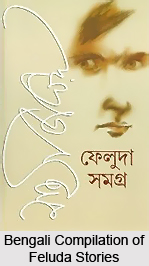 Prodosh Chandra Mitra, or Feluda as he is also known, is a fictional detective in Bengali literature created by Satyajit Ray. There are a series of short stories and novels starring Feluda which have impressed Bengali readers. This quintessential Bengali sleuth lives at Rajani Sen Road, Ballygunge, Kolkata, and West Bengal, India. In the year 1965, Felu Da made his first appearance in a Bengali children`s magazine called Sandesh. His first escapade was Feludar Goendagiri. In almost all his cases Felu Da is accompanied by his cousin Topshe and in the later part of the series, a popular thriller writer Jatayu (Lalmohon Ganguli) entered the scene.
Prodosh Chandra Mitra, or Feluda as he is also known, is a fictional detective in Bengali literature created by Satyajit Ray. There are a series of short stories and novels starring Feluda which have impressed Bengali readers. This quintessential Bengali sleuth lives at Rajani Sen Road, Ballygunge, Kolkata, and West Bengal, India. In the year 1965, Felu Da made his first appearance in a Bengali children`s magazine called Sandesh. His first escapade was Feludar Goendagiri. In almost all his cases Felu Da is accompanied by his cousin Topshe and in the later part of the series, a popular thriller writer Jatayu (Lalmohon Ganguli) entered the scene.
The character of Felu Da had been made into films at different times, where Soumitra Chatterjee and Sabyasachi Chakraborty played the lead role.
Development of the Feluda Character
The first story of Feluda was published in the year 1965 in Sandesh, a children`s periodical founded by Ray`s grandfather, Upendrakishore Ray Chauduri and edited by Ray himself. In the series that followed, the super Bengali sleuth, to solve cases, mainly relies upon his superb analytical ability and observation skill, referred mostly as `Magajastra` or brain-weapon, instead of using physical strength or weapons.
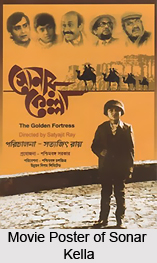 While taking up cases, he is indeed very choosy and goes for the ones that are cerebral and requires the use of `Magajastra`. He is a proud owner of .32 Colt Revolver but he doesn`t use this weapon frequently. He also has through knowledge of martial art and he put that skill to use for solving couple of cases. He is good at disguises too.
While taking up cases, he is indeed very choosy and goes for the ones that are cerebral and requires the use of `Magajastra`. He is a proud owner of .32 Colt Revolver but he doesn`t use this weapon frequently. He also has through knowledge of martial art and he put that skill to use for solving couple of cases. He is good at disguises too.
On a more personal note, FeluDa is a regular Bengali living with uncle and his cousin, Topse. His father was Late Jaykrishna Mitter, who was a Mathematics and Sanskrit Language teachers at Dhaka Collegiate School. Before taking up the profession of private detective, Prodosh Chandra Mitra taught in a school. He always enjoys giving class room like lectures and finds an enthusiastic listener in the form of his cousin Tapesh. He also uses his oratory skill to cajole the culprit in confessing their crime. He is an early riser and starts his day with yoga. Though he is very conscious about his health, Feluda enjoys smoking Charminar cigarettes and chewing betel leaves. Like most Bengali he is also lover of delicious food, famous movies and music and books.
Other characters
While reading a Feluda story, there are other essential characters that one may come across. Two of the most significant characters are Tapesh Ranjan Mitra and Jatayu, Lalmohon Ganguli or Lalmohon Babu. The character of Topse is based on the Arthur Conan Doyle`s conception of John Watson. Topshe is the quintessential assistant and devotedly records each of Prodosh Mitra`s exploits. Feluda lives with Topshe`s family. He is extremely fond and very protective of him.
Jatayu, Lalmohon Ganguli or Lalmohon Babu, is a close associate of Prodosh Chandra Mitra, and is portrayed as the novelist of a Bengali crime thrillers series, composed under the pen name `Jatayu`. His crime stories are typically scoffed as amazing, given that his protagonist superhero Prakhar Rudra is six-and-a-half foot tall.
Following is a list of hard cover edition books with some details:
| Name | Name in English |
| Badshahi Angti | The Emperor`s Ring |
| Gangtokey Gandagol | Trouble in Gangtok |
| Sonar Kella | The Golden Fortress |
| Baksho Rahashya | A Mysterious Case/ The Mystery of the Kalka Mail |
| Kailashey Kelenkari | A Killer in Kailash |
| Royal Bengal Rahashya | The Royal Bengal Mystery |
| Joi Baba Felunath | The Mystery of the Elephant God |
| Feluda and Co. - Collection Containing : | Feluda and Co. |
| Bombaiyer Bombete | The Buccaneers of Bombay |
| Gosainpur Sargaram | The Mystery of the Walking Dead |
| Gorosthaney Sabdhan | Trouble in the Graveyard |
| Chhinnamastar Abhishap | The Curse of the Goddess |
| Hatyapuri | The House of Death |
| Jato Kando Kathmandutey | The Criminals of Kathmandu |
| Tintorettor Jishu | Tintoretto`s Jesus |
| Feluda One Feluda Two- Collection Containing : | Feluda One Feluda Two |
| Ebar Kando Kedarnathey | Crime in Kedarnath |
| Napoleon er Chithhi | Napoleon"s Letter |
| Darjeeling Jamjamat | Danger in Darjeeling |
| Double Feluda - Collection Containing : | Double Feluda |
| Apsara Theatre er Mamla | The Case of the Apsara Theatre |
| Bhuswarga Bhayankar | Peril in Paradise` |
| Nayan Rahashya | The Mystery of Nayan |
| Feluda Plus Feluda- Collection Containing : | Feluda Plus Feluda |
| Golapi Mukta Rahashya | The Mystery of the Pink Pearl |
| London ey Feluda | Feluda in London |
| Robertson er Ruby | Robertson`s Ruby |
Professor Shanku by Satyajit Ray
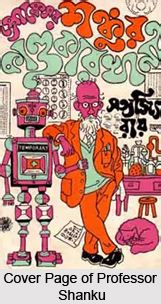 Professor Shanku is an imaginary scientist in Bengali Literature created by Satyajit Ray. There is a series of stories and novels of Professor Shanku that has been a part of Bengali culture for years. The name Shanku is class-less, as viewed by the rules of Bengali Hindu society. His full name is Trilokeshwar Shanku, and is a scientist by profession.
Professor Shanku is an imaginary scientist in Bengali Literature created by Satyajit Ray. There is a series of stories and novels of Professor Shanku that has been a part of Bengali culture for years. The name Shanku is class-less, as viewed by the rules of Bengali Hindu society. His full name is Trilokeshwar Shanku, and is a scientist by profession.
Professor Shanku, at the age of 15, passed matriculation examination of the University of Calcutta. Then, a year later, he received his BSc degree with honours in two subjects, Physics and Chemistry. At the age of 20, he joined the Scottish Church College in Calcutta as a professor of Physics. Professor Shanku is a multilingual person who knows 69 languages. His pet cat, `Newton`, is 24 years old. Satyajit Ray, by his own admission, had based Prof. Shonku on Professor Challenger, by Arthur Conan Doyle.
Character of Professor Shanku
The real name of Professor Shanku is Trilokeshwar Shanku. He lives in Giridih beside the river Usri. He has a male-servant named Prahllad and a cat named Newton living in the house. In his story "The Astronaut`s Diary" (Byomjatrir diary) Ray introduced Professor Shonku, the protagonist of his science-fiction stories.
Other Characters Associated With Professor Shanku
Abinash Chatterjee is the friend and neighbour of Professor Shanku who is completely non-scientific and someone who never appreciates the magnitude of Shonku`s scientific breakthroughs, because of his little knowledge and rather finds it insignificant.
Nakur Chandra Biswas is a character in the Shanku stories who has the power to predict the future.
Jeremy Saunder is a scientist from Britain who lives in London.
Wilhelm Krol is also a scientist from Germany who has keen interest in paranormal activities.
Prohlad is Shonku`s trusted servant and housekeeper for a long time.
Newton happens to be Shonku`s long time pet cat
Inventions Professor Shanku
Professor Shanku is a capable scientist whose inventions have been unique and extraordinary speaking volumes about the capability of the man.
Miracurall - This is a drug tablet that treats any sickness except common cold. The name is an abbreviated form of Miracle Cure for All Ailments.
Annihillin - A pistol competent of vanishing anything that is living.... discovered because Shonku does not like bloodshed.
Shankoplane - A small hovercraft made using anti-gravity technical equipment, proficient of upright take-off and landing and splendid mileage.
Shankovite - This is an anti-gravity alloy which is used to make Shankoplane.
Omniscope - This is a blend of microscope and telescope, which looks like spectacles.
Air-conditioning pill - This is a tablet kept in shirt pocket to keep the body temperature normal in extreme climatic conditions.
Somnolin - This is a sleeping pill that works in almost any condition.








